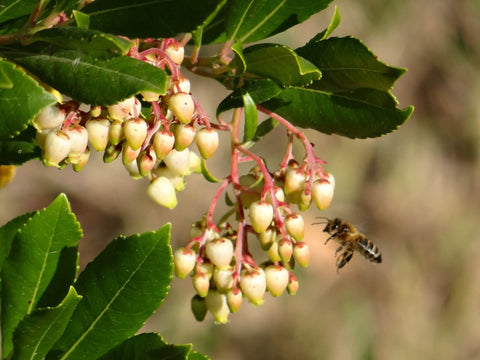The strawberry tree (Arbutus unedo, Ericaceae family) is a small tree 5 to 8 meters high, with a rounded shape, very widespread in the South of France, near the Pyrénées-Orientales, in the Var and in the Corsican maquis.
The strawberry tree is a tree of mild climates: it needs softness in the fall and in the spring to fruit properly. However, it is resistant to temperatures down to -17 ° C and we can consider planting it in regions where the climate is less favorable. Its growth is quite slow and it can live for several hundred years. Some compact varieties can be grown in pots or containers.
It is when most of the fruit trees come to rest that the strawberry tree is adorned with its most beautiful attractions.
Leaves

Its leaves with a toothed border, about ten centimeters long, are oval, alternate, dark green shiny above, pale green below. Its glossy foliage is persistent.
The leaves of the strawberry tree, with antioxidant and anticoagulant properties, act as antiplatelet agents by inhibiting the action of thrombin in plasma coagulation. Their extract promotes aortic relaxation thanks to the presence of tannins, polyphenols and catechin gallate in its composition.
Flowering

The strawberry tree blooms from August until January.
The greenish-white, white bell-shaped flowers hang in clusters. The bell has five small sepals at its base. Above them starts the rounded bell corolla, the base of which bears small indentations. Light yellow at its base, the corolla turns green as it approaches the top. This is where it opens with five small lobes curving outwards.
The flowers appear in August-September, at the same time as the fruits.
The fruits

Fruits need over a year to mature, usually from October. Thus in October, November and December, the strawberry tree can bear at the same time its new flowers and its fruits, born from the flowers of the previous year, in the process of ripening. Their resemblance to strawberries has earned the strawberry tree the name Strawberry Tree.
The orange-red fruit when ripe is a fleshy, spherical berry with a rough skin, covered with small conical tips. It is edible, tasteless, and rich in vitamin C. The flesh is soft, a little floury, tart and sweet, and it contains many small seeds.
The beekeeping interest

The abundance of its sweet nectar attracts many bees.
Our young beekeeper, Colin Dupré, who took over his father's operation a year ago, explains that Arbousier honey remains unknown in France. However, this honey is a treasure for the beekeeper and especially for the beehives, which touch the honey before winter: it allows the bees to spend the winter without difficulty and the colonies to start faster in the spring without any sanitary problem. Produced every 2 to 3 years, it is a rare honey and considered in Italian culture "THE" medicinal honey par excellence.
Arbutus honey selected by Miel Factory
The Arbutus honey selected by Miel Factory is harvested from November in Haute-Corse, in the region of Balagne, located on the northwest coast of the island. This region stretches for 40 kilometers along the Mediterranean coast, and combines dream beaches, bustling towns, authentic hinterland and mountainous backdrops.

Our Corsican PDO Arbutus Honey consists mainly of arbutus associated with ivy, sarsaparilla and viscous inula. This honey is the delight of lovers of powerful flavors. Its bitterness and woody scent make it a honey with strong typicity.
The arbutus has anti-inflammatory, astringent and diuretic properties. This natural antiseptic is recommended to fight against urinary infections. It helps relieve rheumatism, hypertension, arteriosclerosis, arthritis and improves blood circulation.
 discover
discover
All Corsican honeys selected by Miel Factory are PDO.
Our Corsican honey gift box will allow you to immerse yourself in the bewitching flavors that characterize the honeys of the Island of Beauty.










